Growing ginger is quite interesting. But how do you increase ginger yield? It is where fertilizer plays a vital role. Feeding the plants in the right way with the right fertilizer makes a huge difference in the crop yield.
A commercial mix with an NPK 10-20-20 or a natural fertilizer like vermicompost would be ideal for fertilizing the ginger plant. Ginger plants need to be fertilized after new shoots appear. Continue fertilizing throughout the growing seasons and stop when the plants begin to flower.
This article will cover all information about fertilizing, the right time, frequency, techniques, and some best fertilizers. We will also share the adverse effects of over and under fertilization.
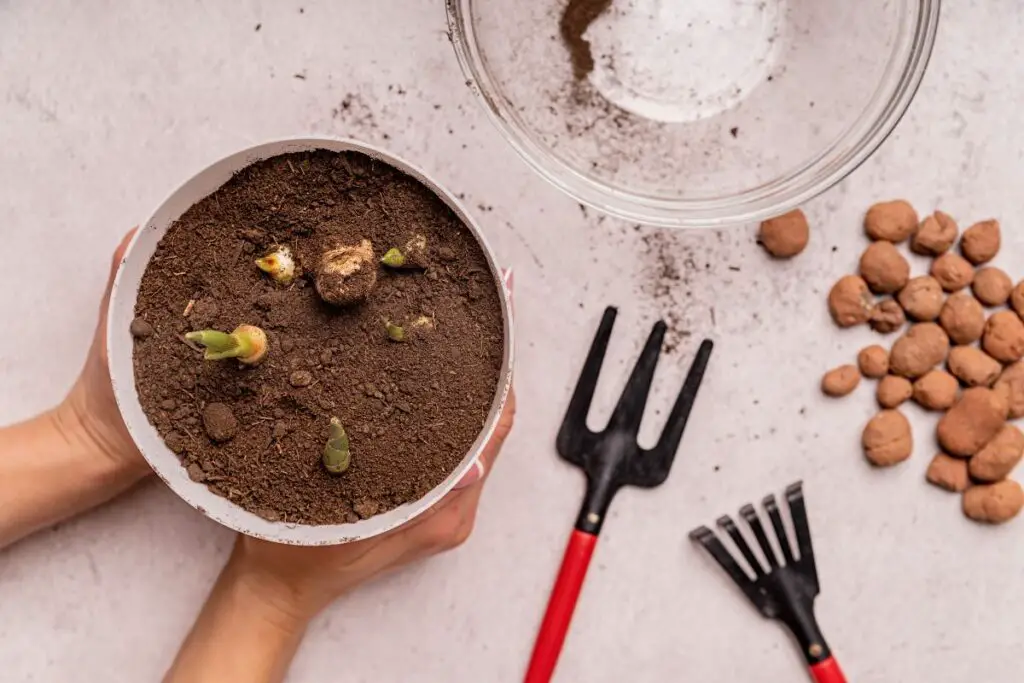
When and how often should I fertilize my ginger plants?
Ginger plants are heavy feeders and need their nutrients in the right proportion at the right time.
If you have already amended the soil before planting with healthy compost, you don’t have to worry about fertilizing right after planting.
When the new shoots appear, fertilize the plants and feed them regularly at proper intervals.
If you use slow-release fertilizers, apply them every 3-6 months.
You can apply this as broadcasting at the time of planting and top-dressing 2-3 times in summer.
After that, start normal fertilizing with liquid fertilizer.
Apply a liquid fertilizer every month or every few weeks throughout the growing seasons when new shoots appear.
Stop feeding once the ginger plants begin to produce flowers.
If you live in a region with frequent rainfall, you may have to feed the plants more often as the nutrients might leach away due to excessive moisture.
There are generally 3 different situations where ginger will benefit from fertilizing:
- At the time of planting, if you have not added compost.
- Every time you observe, the new plant develops a bit, and some pink color appears at the stem base.
- Every 6-8 weeks throughout the growing seasons.
When the ginger begins to produce flowers, add potassium fertilizer to help the plant grow juicy and plump ginger rhizomes filled with moisture.
To understand when and how often to feed the ginger plants, keep an eye on the leaves, pink stems, and rhizomes.
What are the fertilizer considerations for ginger plants?
Before fertilizing the ginger plants, consider a few things.
It helps you know whether the plants need feeding, which would be the best, and how much.
Let’s check the factors:
Testing the soil
Before adding extra nutrients to the soil, know what nutrients are already present in the plant.
You can also know the soil’s pH levels.
Fertilizers can mess up or alter the soil’s pH and nutrition levels.
So, consider a soil test before fertilizing.
Nutrients
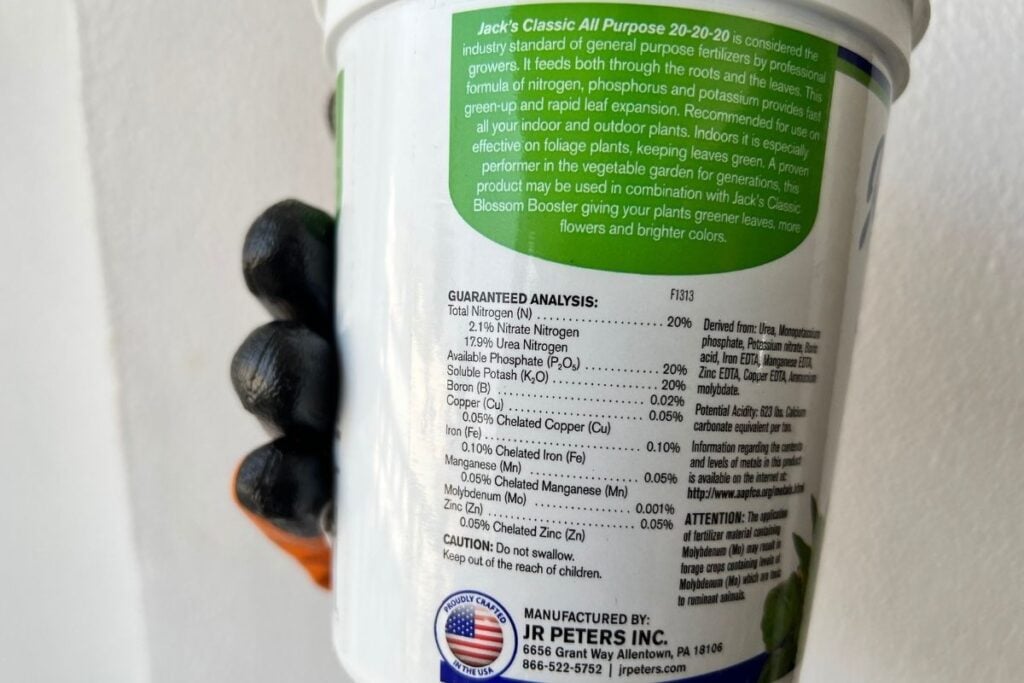
For good ginger growth, you must provide them with fertilizers that contain the required nutrients.
The essential fertilizers needed by the ginger plants include:
| Nutrients | Importance |
|---|---|
| Carbon | Received from the air and good for plant growth |
| Hydrogen | Received from the water for strong plants |
| Oxygen | Received from water and air, needed for the overall growth and development. |
| Nitrogen | This nutrient is rarely available in garden soils. It helps in fast growth. |
| Phosphorus | It helps in good root growth. |
| Potassium | It makes the plant disease and drought-resistant. |
| Magnesium | It aids in good sunlight processing. |
| Sulfur | It gives the plant adequate protein. |
Other micronutrients include:
- Boron
- Copper
- Iron
- Calcium
- Chlorine
- Zinc
- Manganese
NPK ratio
When you select a fertilizer, it has a ratio in NPK.
It stands for nitrogen (N), phosphorus (P), and potassium (K).
When you choose a fertilizer for ginger plants, the best one for them is an NPK ratio of 10-20-20.
It contains 10% nitrogen and 20% phosphorus and potassium each.
Don’t use a fertilizer high in Nitrogen content.
Otherwise, the plant will concentrate more on growing leaves and less on the rhizomes.
You can add alfalfa meal, kelp, or organic matter like compost to amend the soil instead of using fertilizer.
Looking for gardening supplies? We have tested 100's of products before recommending them to you guys. Check out our best pick below:
| Image | Gardening Supplies | Best Price? |
|---|---|---|
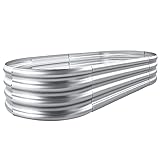 Top
Top Top
Top | Raised Garden Bed Kit | Check On Amazon |
 | XLUX Soil Moisture Meter, Plant Water Monitor, Soil Hygrometer Sensor for Gardening, Farming, Indoor and Outdoor Plants, No Batteries Required | No Results |
 Top
Top Top
Top | 82 Pcs Garden Tools Set and Extra Succulent Tools Set | Check On Amazon |
 | Joeys Garden Expandable Garden Hose with 8 Function Hose Nozzle, Lightweight Anti-Kink Flexible Garden Hoses, Extra Strength Fabric with Double Latex Core, (50 FT, Black) | No Results |
 Top
Top Top
Top | Dual Chamber Compost Tumbler | Check On Amazon |
 Top
Top Top
Top | Sunnyglade Plant Stakes | Check On Amazon |
 Top
Top Top
Top | Organic Cold Pressed Neem Seed Oil | Check On Amazon |
 Top
Top Top
Top | Mighty Mint Gallon :-Insect and Pest Control Peppermint Oil | Check On Amazon |
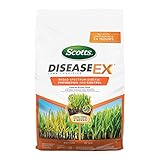 Top
Top Top
Top | Scotts DiseaseEx Lawn Fungicide | Check On Amazon |
 Top
Top Top
Top | Jacks Classic 20-20-20 All Purpose Fertilizer | Check On Amazon |
 Top
Top Top
Top | 30,000 Seeds Pollinator Attracting Wildflower Mixture | Check On Amazon |
 Top
Top Top
Top | Survival Vegetable Seeds Garden Kit-Over 16,000 Seeds | Check On Amazon |
Fertilizer types
Three types of fertilizers can be used for ginger plants:
- Chemical fertilizers
- Natural fertilizers
- Manure
Chemical
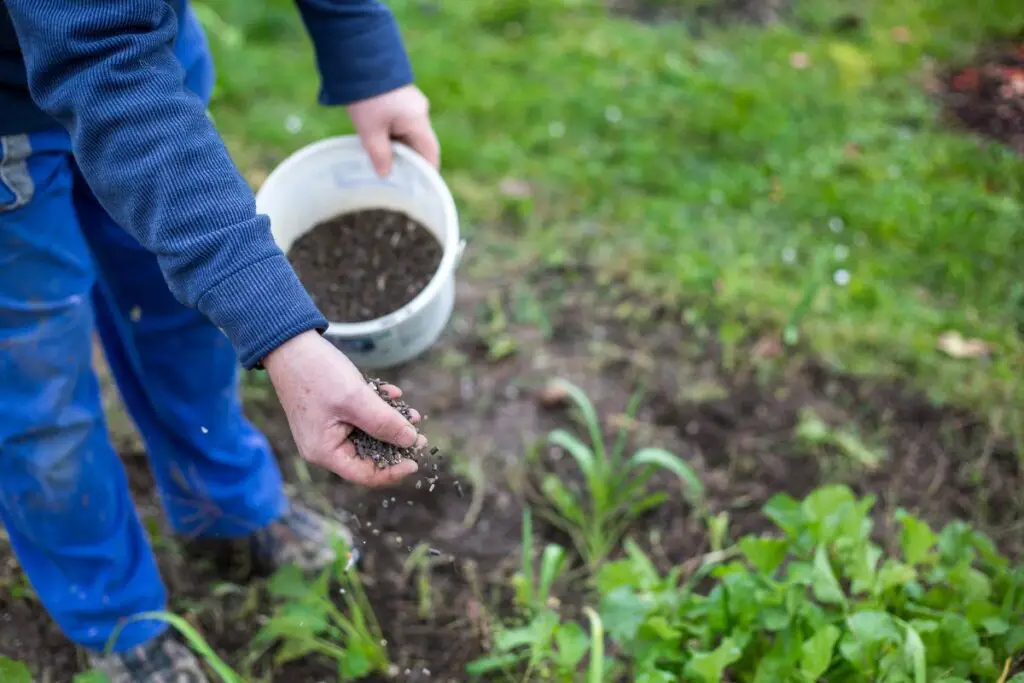
Chemical fertilizers come in multiple forms – liquid, granular, and pellets.
Liquid fertilizers work instantly.
Dilute it into the water at half the strength and then apply around the plant every month.
Pellets or granules are slow-release fertilizers applied only once or twice in the growing seasons.
These fertilizers release their nutrients slowly, and the plant absorbs them as needed.
It also saves your time from frequent applications.
Natural
Natural or organic fertilizers are also good for ginger plants.
They release their nutrients slowly, like the time-release fertilizers.
One advantage is that these fertilizers rarely harm your ginger plants compared to chemical fertilizers.
Manure
You can use manures like cow or chicken manure for ginger plants.
These are organic and also work as slow-release fertilizers.
This combination will keep the ginger plants healthy in the long run.
What are the best fertilizers for ginger plants?
There are many best fertilizers available in the markets for ginger plants, both organic and synthetic.
Synthetic fertilizers
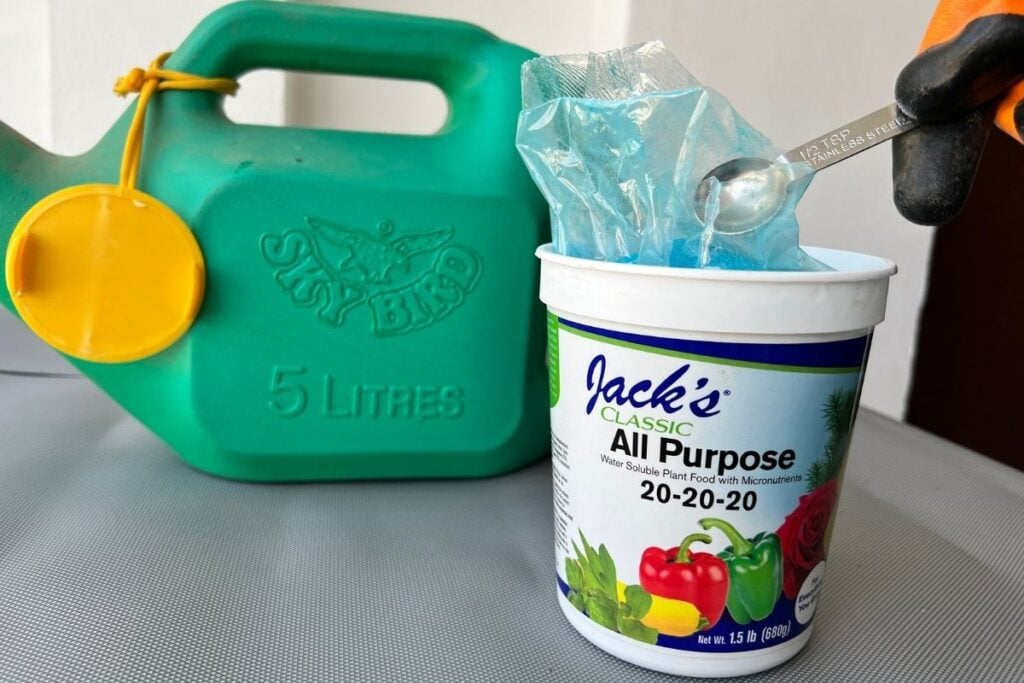
Both liquid and slow-release fertilizers are best for ginger plants.
If you use liquid fertilizers, the best fertilizer with the best NPK is 20-20-20.
It contains low nitrogen and high phosphorus, and potassium.
Using this fertilizer will make the plant focus more on the rhizomes and less on the leaves.
Slow-releases are best for ginger if incorporated during planting and for top-dressing.
However, you can also use them in the summer after new shoots have appeared, 1-2 times during the growing months.
Some commercial fertilizers are:
- Miracle-Gro All-purpose Plant Food
- Osmocote Flower and Vegetable Plant Food
- Dr. Earth’s Vegetable Fertilizer
- Jacks Classic 20-20-20 All Purpose Fertilizer
Animal manures
In animal manures, you can use chicken manure or cow manure.
However, cow manure is generally used to increase the soil quality but doesn’t add enough nutrients to the soil.
Chicken manure
For a good organic all-purpose fertilizer, chicken manure is a suitable option.
It is only good if it is aged for a few weeks to months.
Fresh manure is very aggressive for the plants as the direct application can burn the plant.
Aging them well reduces the intensity of the burning.
Chicken manure is a slow-release fertilizer.
It will require less frequent application, and the slow release of nutrients will keep the ginger safe and happy.
Cow manure
Cow manure is also a good fertilizer and can be used as compost.
The ingredient works as a slow-release fertilizer and, thus, is gentle for the plants.
This manure also requires aging as the fresh manure contains excessive high Nitrogen.
The ginger plants do not appreciate high nitrogen because it causes more leaf growth and less rhizome growth.
Add the manure to the soil before planting.
After planting the rhizomes or seeds, add a layer of mulch and water the soil.
Cow manure can be enough for one season if you can get enough of them.
Organic fertilizers
- Pure seaweed extract’s initiate cell growth and vigorous root and stem growth
- Trace elements that Maxi crop Liquid Seaweed contains are important as activators of enzyme systems
- Maxi Crops basic is a pure 100% seaweed extr
Some best organic fertilizer options comprise:
- Fish emulsion
- Seaweed extract
- Alfalfa meal
- Kelp meal
Use organic fertilizers like fish emulsion or seaweed extracts every 6-8weeks.
Homemade fertilizers
There are many homemade fertilizers available around us.
Coffee grounds
Coffee grounds are one of the most common ingredients used for plants.
Coffee grounds add adequate nitrogen and other essential nutrients to the soil.
However, you must know that fresh unused coffee grounds can increase soil acidity.
On the other hand, used coffee grounds have neutral pH levels but are filled with essential nutrients.
You can use fresh coffee to alter the soil pH level and the used coffee grounds as compost and liquid fertilizer.
Epsom salt
Epsom salt works great for the ginger plants because they have enough magnesium, which helps the plant to absorb the other minerals from the soil.
The salt should only be applied when required, and if you are growing your ginger plants with natural ingredients like compost and manures.
How do I apply fertilizer to the ginger plants?
To fertilize the ginger plants, you must know the proper method of fertilizing.
Fertilizer application according to the type
Liquid fertilizer
- Dilute the fertilizer and make it half the strength.
- Apply the fertilizer around the ginger plants, away from the sides of the plant
- Water the plant to dilute the fertilizer more to prevent burns.
Pellets or granular
- Push in the pellet or spread the granules around the plant, away from the ginger side and base, 10-12 inches away.
- Water the soil to activate the nutrients to get released.
Foliar spray
Ginger plants highly benefit from foliar sprays as the plant can absorb the fertilizers directly through the leaves.
To apply a foliar spray:
- Dilute the fertilizer with water and transfer it to a spray bottle.
- You can also use Epsom salt here as fertilizer (1 tablespoon per 5-liter water).
- Spray on the leaves during the first 2-3 months and not after that. It is the time when the plants may lack nutrients.
It should be done when the soil doesn’t have sufficient nutrients to give the plant.
Fertilizer application according to quantity
| Application type | Description |
|---|---|
| Light application | This is done when the seedlings develop some branches. Apply fertilizer with water, maintaining a gap of 10-15 days. Feed the plant each time with high nitrogen. |
| Heavy application | This is done when the ginger plants have started growing vigorously. It is time for top-dressing with high amounts of potassium compound fertilizer. |
| Cultivation of supplementary fertilizer | This application is done at the tuber enlargement when the plant has grown 6-8 branches. Add 25-50 kg of potassium compound fertilizer per acre into 2 parts at 15-day intervals. You can also do foliar spray with 0.2-0.3% potassium dihydrogen phosphate solution 2-3 times. |
Fertilizer application according to the timing
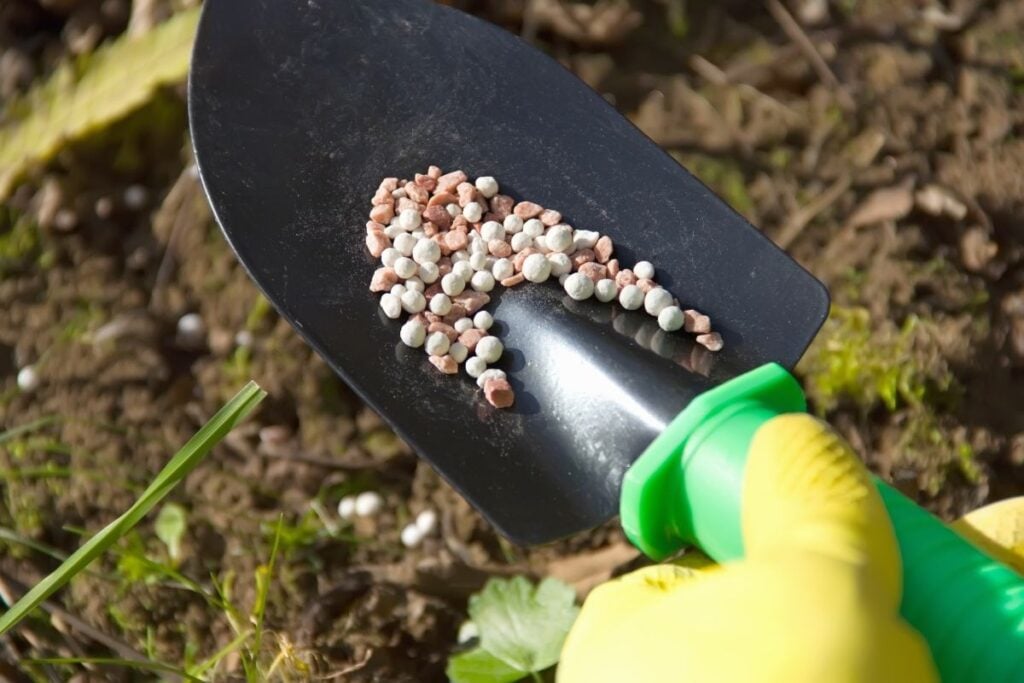
At the beginning of planting, add compost like cow manure to the whole soil bed, 25-50 tonnes per hectare.
You can add nitrogen after 40 days and again after 50 days, 75kg per hectare.
Once you find new shoots, you can apply liquid fertilizers every month or slow-release once or twice a year.
What happens if I don’t fertilize the ginger plants?
Ginger plants are heavy feeders.
Adequate nutrients make the plants healthy and the rhizomes bigger, healthier, and tastier.
Lack of nutrients will make the leaves display some signs like:
- Yellowish green leaves
- Short internodes
- Reduced growth
- Brown edges on the leaves
- Young leaves having interveinal chlorosis or yellow leaves
- Reddish tints on the leaf margins
- Small leaves
How do I correct the nutrient deficiency in ginger plants?
The best way to correct the nutrient deficiency is by fertilizing the ginger plants at the right time.
- You can add compost or well-rotted chicken manure to add nutrients to the soil.
- Try adding some liquid fertilizers and wait to see the plant’s reaction.
- Yellowish leaves with red margins and small leaves are signs of a lack of nitrogen. Consider foliar spray with 1% urea or 2% DAP fertilizer every alternate week.
- Reduced growth, short internodes, and brown marks are signs of potassium deficiency. Apply 3.7 kg of potassium per acre or foliar spray with potassium sulfate at fortnight intervals.
What happens if I overfertilize the ginger plants?
Though ginger plants are high feeders, over-fertilization can cause harm to them and reduce their yields instead of increasing them.
Signs of overfertilization are:
- Excessive leaf growth due to high nitrogen amounts
- Reduced number and size of rhizomes
What to do if ginger plants were overfertilized?
- The first step is to stop fertilizing immediately.
- For prevention, you should use fertilizer in the right ratio and in the right way.
- If you are using manure, it should be aged for 3-4 months. Fresh manure is quite harsh for the plants and has excessive nitrogen.
- If you are using natural fertilizers like fish emulsion or seaweed, it should be only 1-2 teaspoons diluted with water.
- If you apply liquid fertilizers, use them only once a month or every few weeks. Maintain proper gapping.
- If you are using slow-release, use it every 3-6 months, depending on the plant’s needs.
Final thoughts
To increase ginger growth, fertilizing is the main key to receiving more healthy, big, and tasty ginger rhizomes. There are several options for fertilizing ginger plants, like manures, organic fertilizers, and synthetic fertilizers.
The best time to fertilize ginger plants is during the spring and summer, once a month after new shoots appear, with a fertilizer having NPK 20-20-20. Stop when it flowers.
Add compost before planting to increase the soil quality and fertility. Don’t apply any fertilizers during the winter. They will be dormant and won’t need extra nutrients.
Reference: Ginger Production, Texas AgriLife Extension, USDA, Wikipedia

